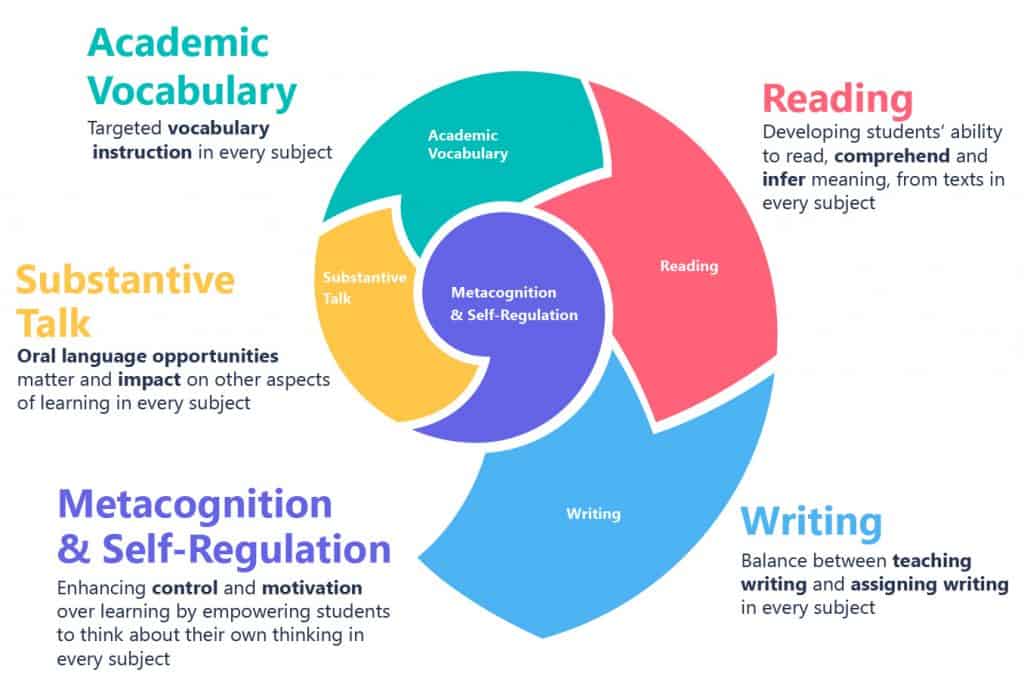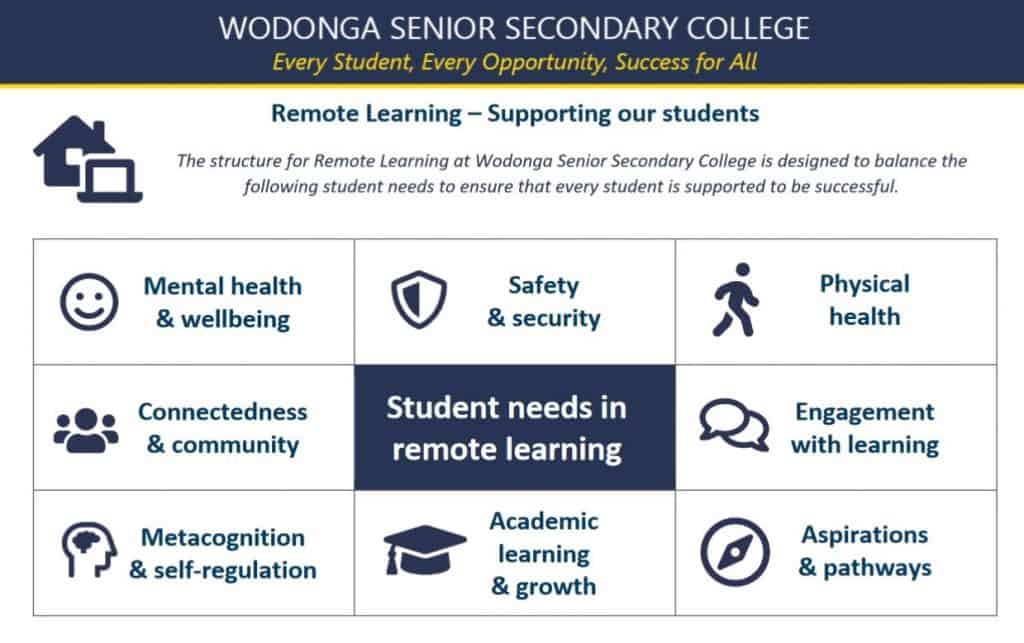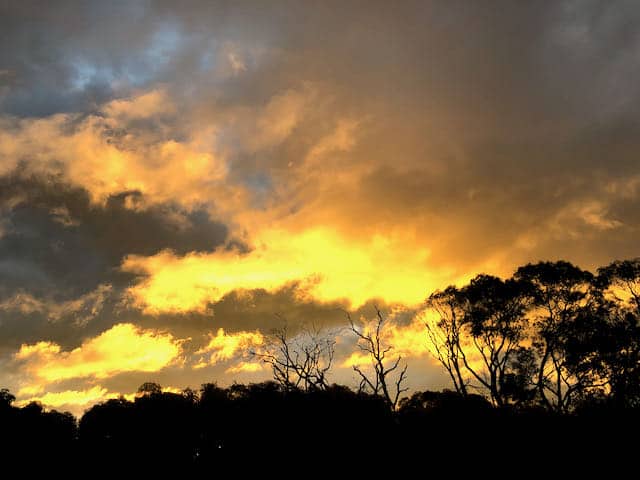Bushfires. Pandemic. Lockdowns. Remote Learning 1.0 and 2.0. What a year it has been. Before the door closes for some rest and recovery, time now for some reflections on the experience of this year and the implications for the future.
The context for this reflection is my work as Assistant Principal for Curriculum at Wodonga Senior Secondary College, a school of approximately 820 students in regional Victoria with a significant degree of educational disadvantage. It has been a huge year for our school community, with myriad challenges, however we come to the end of the year with much cause for celebration and gratitude.
The concluding remarks to my article on Learning in Lockdown in Teacher Magazine in June of this year remain just as true now:
The resilience, determination and capability of teachers has been strongly underscored during this time. As too has the value that students, including those from disadvantaged backgrounds, place on their learning, and their ability to take responsibility for their learning. This experience has also highlighted the central role that schools fulfill in providing a learning community that supports students to meet the full range of their needs. And finally, it has highlighted the critical role of processes, structures and leadership in ensuring success in challenging times.
So what have we learnt from this experience?
The professional work of the teaching profession is valuable
Surely this isn’t a controversial statement, yet often the professionalism and capacity of teachers (and schools) is diminished in political, media and community discourse. This year there was no hesitation in considering education an essential service. Our work has been more visible to the wider community. Learning from home has given parents and carers a box seat in their child’s learning experiences and the exceptional support provided by educators. Initial feedback suggests that this has led to a much greater appreciation of and respect for our work.
Will this fade in time? Only if we allow it to and we must not. When our professional work is respected we are in a much better position to form partnerships with parents and carers that support every student to succeed. To this end we all have a role to play in owning our professionalism; being bold enough to share more openly our specialised knowledge and expertise (without downplaying or oversimplifying it); and brave enough to open our classrooms and practices up to parents and carers (without fear of others observing minor faults, errors, or things that just didn’t work). In a sense, owning our own role as dedicated and effective learners.
As leaders, schools and systems this experience also begs the question of how we can do better in valuing the work of educators. Whilst the answers will vary, for me the following are key: demonstrating professional trust; supporting professional risk taking and growth; and enabling greater flexibility and work-life balance.
All students are capable of taking responsibility for their learning with appropriate supports.
This year we had a unique opportunity to test a hypothesis on a large scale. Within the curriculum leadership at my school we have long believed that despite significant educational disadvantage all of our students are fundamentally capable of taking responsibility for their learning when supported appropriately.
The efforts of our students this year overwhelmingly support this hypothesis. They chose to turn up for online learning, with attendance figures matching and at times exceeding that for on site learning. Time and time again they expressed their gratitude for being able to continue to learn. And regardless of the continually changing situation and the many challenges that arose, they persisted.
Moving forward, this experience has doubled our resolve to continue the work we have started in recent years to support our students to develop their meta-cognition and self-regulation. This lies at the heart of their literacy as reflected in the framework we have developed this year, and is critical for their ability to make the most of their opportunities in the world.

Schools play a vital role in supporting the balanced picture of student needs.
An early step we took in response to the pandemic was to acknowledge the broader role that schools fulfil for students and to develop a complete and balanced picture of student needs. This is not news, but putting this front and centre in our work this year has been critical to our success.

This work has allowed us to better support our students as a whole person; given leadership a clear tool for reflection; and provided teachers with clear and explicit permission to dedicate time and effort beyond academic outcomes. As a result, we will continue to use this to guide our work into the future.
Processes, structures and leadership matter. Especially so in challenging times.
The relative ease with which our school has dealt with the many challenges of this year reflects not only the work of 2020, but also many years of largely behind the scenes focus on processes, structures and systems. Having these supports in place allowed us to rapidly respond to all of the unpredictable changes that arose.
This is of course also a reminder that leadership matters. Not just in making effective and timely decisions, as much as that was a huge part of this year. But also in leading with trust, authenticity and empathy.
What did that look like for us? Acknowledging the challenges as real and very unprecedented. Working with staff to find solutions and address issues as they arose. Openly appreciating the dedicated efforts of staff. Focusing on what we did know, and what we could control, and modelling this for staff and students alike. Checking in individually with staff on a regular basis.
And what might this experience point to in our future.
Was 2020 a once off, or a preview of future disruption?
There is certainly a palpable desire within the community to return to some kind of normal. But is that likely. To me, this quote from Jim Collins is powerful.
If the first two decades of the 21st century have taught us anything, it’s that uncertainty is chronic; instability is permanent; disruption is common; and we can neither predict nor govern events. There will be no ‘new normal’; there will only be a continuous series of ‘not normal’ episodes, defying prediction and unforeseen by most of us until they happen.
Jim Collins in Entrepreneurship 2.0 via Brene Brown
And some of the coming disruptions are at least broadly predictable. The impacts of global heating are increasingly being felt around the world and our action remains vastly inadequate. This will lead to many and varied disruptions in the lives of the students of today. Inequality and injustice, both past and present, are front and centre in many societies around the world and cannot simply be wished away or solved by a minor political change. The reckoning with this will also dominate our future.
Is that all a bit bleak after a challenging year? Perhaps, but it also makes it crystal clear that the vital skill set of the future is not about being a ‘digital native’ or ‘knowledge worker’ but rather about coping with change and adapting. The good news is that humans are wired for change. Our brains are malleable and incredibly capable. And we thrive and find meaning when faced with challenge, in particular when we respond as a community.
There is space in the curriculum and the system for innovation.
Some good news. There is plenty of opportunity within school curricula and systems for innovation to address the challenges ahead.
This is particularly true in Victoria where we have a very open and flexible curriculum structure and schools have a large degree of autonomy in their operation. However, both of those things have been true for some time and most schools remain quite traditional in their approach. So the challenge is to take the lessons of this year and the opportunity now to make change.
For us, in the short term, this will involve redoubling our efforts to work with teachers, students and families to develop meta-cognition and self-regulation. Timely formative assessment to enable rapid triage and intervention will be supported to remain as effective as it has been this year.
In the medium term it is time to revisit some of our structures and processes. We significantly shifted our weekly schedule during Remote Learning and there was a very positive response across our learning community to the introduction of Independent Learning time. The next step for 2021 is to work out what making the best parts of this structure a permanent part of our on site learning program.
Similarly we are also exploring a range of options to increase our use of blended learning, both within regular programs, and also with the potential to expand and offer new courses that better meet the needs of students that may not be well served by face to face teaching at all times.
Towards the longer term there are bigger questions, not necessarily for one school alone to answer, but questions that we must address as leaders, innovators and systems. How can we shift our structures to better support students to develop the knowledge and skills required to thrive in a disrupted world? How can we ensure all students gain fundamental knowledge and skill foundations through their school education? What would a school look like if it had well-being at its heart? How can we ensure every young person finds opportunity and belonging in education? I look forward to finding out!


Leave a Reply
You must be logged in to post a comment.